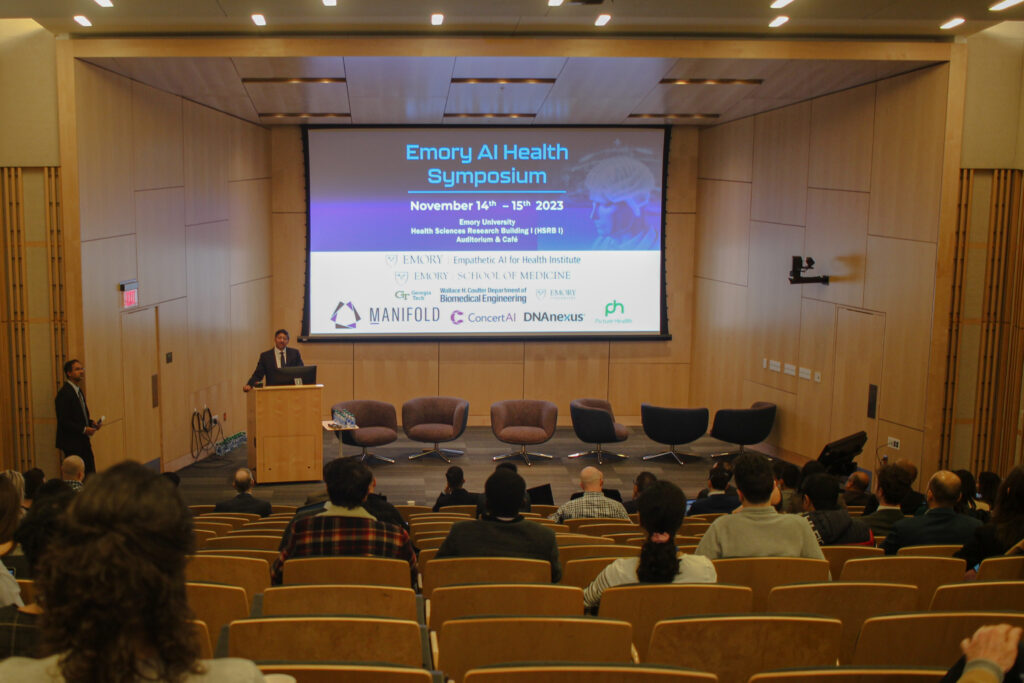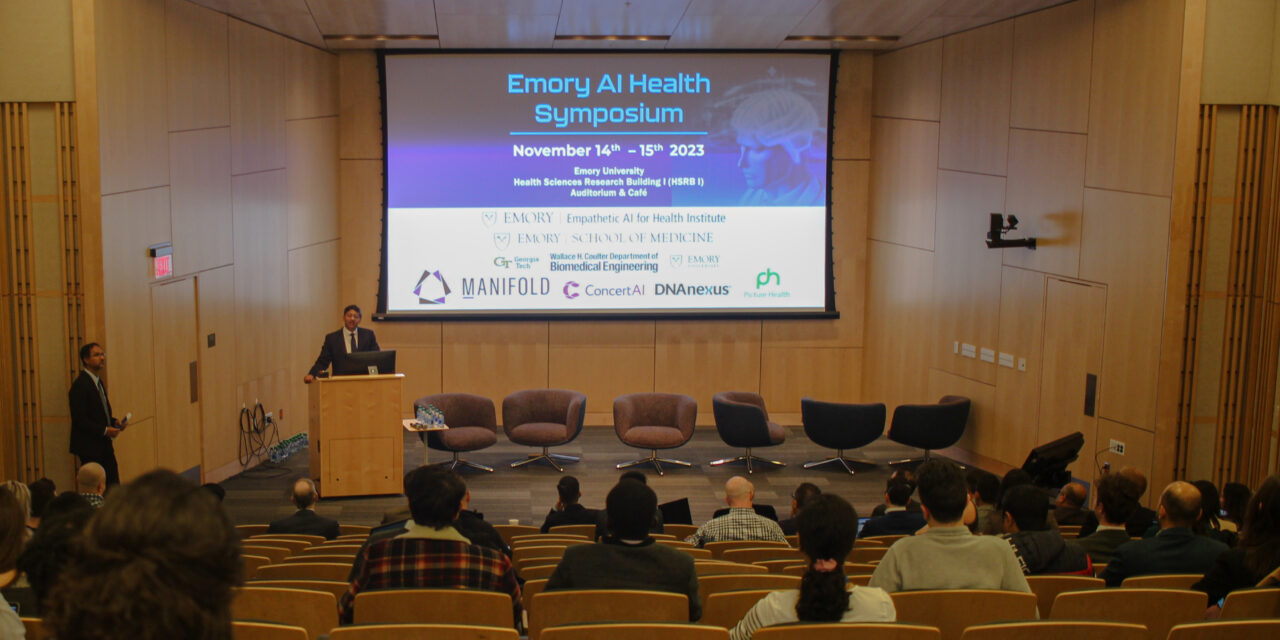Emory University officially launched the Emory Empathetic AI for Health Institute yesterday during the first day of the AI Health symposium, which focused on topics such as implementing artificial intelligence (AI) in public health, data security and privacy, and bias and trust in AI. Today, the second day of the symposium will feature discussions based on AI in genomics, pathology and the implementation and cost of AI.
At the symposium, Provost and Executive Vice President for Academic Affairs Ravi Bellamkonda spoke about how Emory can use AI to address inequities in healthcare.
“Can we come together to affect patient outcomes, to decrease costs, to increase efficacy?” Bellamkonda said. “This is the challenge and this is what our success should be measured by at this institute.”
The Empathetic AI for Health Institute will innovate Emory’s health care system under the AI.Humanity Initiative, according to Center for AI Learning Director Joe Sutherland.
The institute and Emory Healthcare aim to close the health disparity gap among populations of color in the United States by developing accurate risk prediction models for disease diagnosis, prognosis and treatment response prediction, according to Anant Madabhushi, the institute’s executive director.
“As we think about the AI, we need to make sure that we’re imbuing that same sense of empathy into the development and the application of these AI tools for precision medicine,” Madabhushi said.
New faculty
To support Emory’s AI.Humanity Initiative, the University announced the addition of 19 new faculty members earlier this month. Since the initiative’s launch in 2022, Emory has added a total of 39 new faculty members and plans to hire up to 60.
Department of Biomedical Informatics Assistant Professor Hyeokhyen Kwon, Assistant Professor of Mathematics Manuela Girotti, Professor of Quantitative Theory and Methods Jo Guldi and Assistant Professor in Biostatistics and Bioinformatics Chang Su are among the new faculty members and said that they are optimistic about the trajectory of AI and the advancements it will bring to their research.
Kwon, for example, wants to use AI to develop accessible, objective disease assessments, specifically Parkinson’s disease. He hopes to partner with the Emory hospital system and other experts in the field to test and deploy devices that can help monitor diseases.
Specifically, by quantifying and detecting changes in the movement of patients, Kwon sees a future where technology can prompt early intervention to elongate patient health.

Provost and Executive Vice President for Acadamic Affairs Ravi Bellamkonda opens the Emory AI Health Symposium in the Health Sciences Research Building with a speech on Nov. 14. (Spencer Friedland/News Editor)
Additionally, Su uses single-cell RNA sequencing to develop statistical methods for understanding the functional organization of genes, which entails gene expression profiling for individual cells in the genome.
“The area I’m working on wouldn’t be possible without a large amount of data and also the AI-based method that was motivated or called for by this data,” Su said.
Girotti, one of the 19 new faculty members, said the AI.Humanity program is “great” because it allows her to collaborate with professors in other fields on her research.
“You can name any field and there are some applications,” Girotti said.
Girotti is an associate member of the Mila Institute, a community of more than 1,000 researchers and students who focus on machine learning and AI. Their AI for Humanity team leads initiatives in Quebec to increase AI knowledge among researchers, policymakers and the general public, as well as advocate for ethical AI implementation.
Emory also hired Guldi, who is a digital historian. She noted that Emory has one of the “few centers for digital fellowships in North America.”
“It is very important that as our society moves toward AI, we don’t lose sight of the collective good that can come out of simply knowing ourselves and knowing our society,” Guldi said. “The more work we do, the more research we do, about how society is changing and how individuals are changing, the better we understand our democracy.”
However, Center for AI Learning Student Fellow Matthew Sharp (22Ox, 24C) and Su stressed that AI may have some unintended consequences.
Su explained that genomic data collected by AI has largely not been representative of different races and ethnicities, which can cause results from AI to be “biased.”
“That is the research hot topic right now,” Su said. “Try to incorporate that in building a prediction model and recognize that sometimes what we found does not apply to everyone.”
Sharp believes that unequal access to AI as new technologies are integrated into society will be a challenge.
“We need to make sure that AI specifically is incorporated in a way that everyone gets their voice heard,” Sharp said. “If we’re able to do that, then it would be a really positive transformation in society as a whole. We’d be able to make health care, things like that, so much easier to use.”
Kwon believes that AI can be used to objectively diagnose patients in a biased medical system.
“Although you’re trying to really teach new doctors … objective and unbiased lessons, but there still somewhere is bias,” Kwon said. “If you have objective AI system that can be fair across different races, sex and then ages … it can really revolutionize how we care for people across different demographics.”
Emory’s Center for Ethics has branched out to explore and highlight the role of ethics in AI, which is often overlooked, according to Center for AI Learning Senior Program Coordinator Tommy Ottolin.
“AI ethics is all about evaluating, ‘Are we doing this the right way?’” Ottolin said. “‘Is our approach thoughtful and mindful and inclusive and fair?’ They’re really important humanity questions that again make sense for Emory to be asking, but the … ethical piece of AI is not always asked within more tech-focused businesses or groups.”
Because of the ever-growing nature of AI, Ottolin said it is likely the Center for AI Learning will open new institutes and increase hands-on learning opportunities in the near future.
“One of the main goals of this initiative too is to make artificial intelligence more accessible and more easily understood by all,” Ottolin said. “It’s not too late if you feel like you’re not sure what’s happening, or you don’t know where to begin, the center can help you decide and navigate the variety of resources we have on campus so you can start to catch up.”





